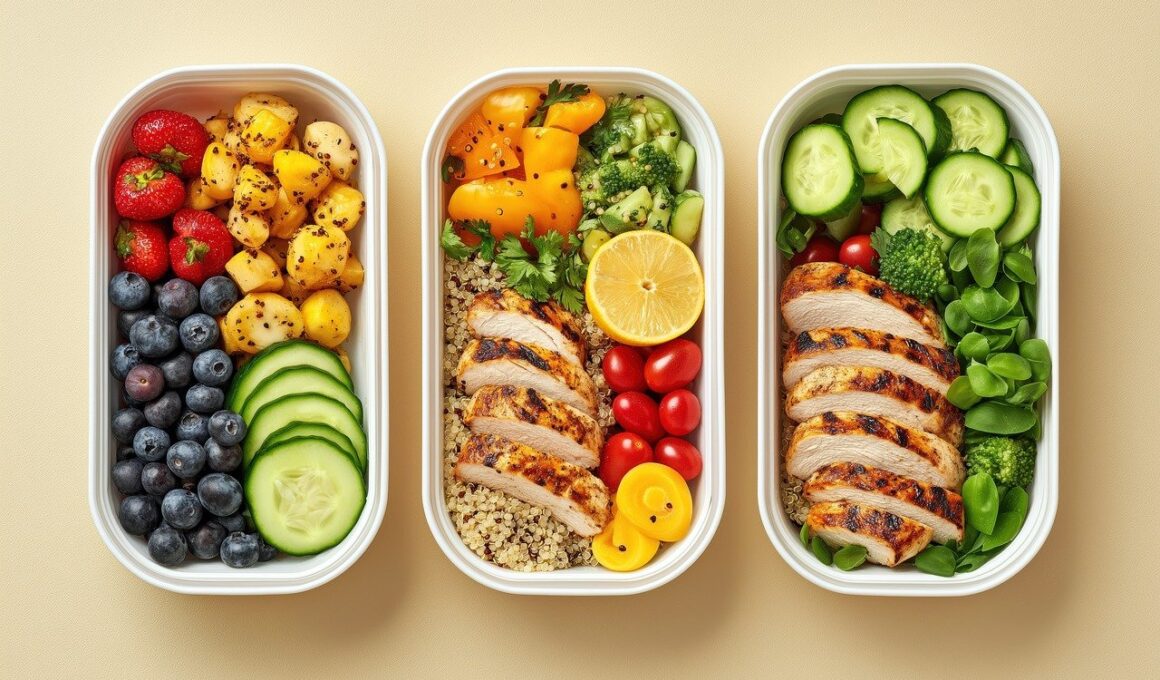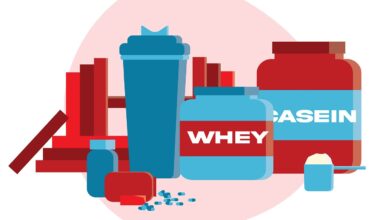Meal Prep Ideas Tailored for Calisthenics Athletes
For calisthenics athletes, meal prep is essential for optimizing performance. To build strength and endurance, athletes must focus on balanced nutrition. Meal prep can help ensure they have healthy meals ready when needed, minimizing the temptation to snack on unhealthy options. Here are ideas to make meal prep easier: first, select recipes that focus on lean proteins, healthy fats, and complex carbohydrates. For protein sources, consider chicken, turkey, eggs, and legumes. Healthy fats can come from avocados, nuts, and olive oil. Complex carbohydrates can include quinoa, brown rice, and sweet potatoes. Each recipe should contain a combination of these nutrient-dense foods, fueling workouts effectively. Next, prepare batches of meals to store in the refrigerator or freezer, making them easily accessible. Use containers that are microwave and dishwasher safe. Lastly, don’t forget to set aside a day each week for meal prep; this makes it easier to stick to healthy eating habits throughout the week. With planning and preparation, calisthenics athletes can focus on their training instead of worrying about what to eat.
When preparing meals for calisthenics, including variety is crucial to keep meals exciting. One way to add variety is to create different flavor profiles for each dish. For example, try making grilled chicken with lemon and herbs one day, and a spicy stir-fry with ginger and soy sauce another. Mixing up the spices and marinades can change the taste of otherwise similar ingredients, making the meals much more enjoyable. You can also try incorporating seasonal vegetables in your meals to take advantage of fresh produce. Roasting or sautéing vegetables is a great way to enhance their flavors. Additionally, consider making large salads with various toppings, such as chickpeas, nuts, and seeds, to provide both nutrients and satisfaction. To maintain a balanced diet, ensure each meal contains a source of protein, healthy fats, and carbohydrates. Finally, it can be helpful to maintain a meal journal, tracking what works well and what does not, allowing adjustments in your nutritious meal prep routine. By creating interesting meals, athletes will be less likely to stray from their nutrition plan, ensuring optimal performance.
Storage and Efficiency in Meal Prep
Efficiency in meal prep can help calisthenics athletes eat well while saving time. One of the best tips is to invest in quality food containers that are stackable and airtight. This helps store cooked meals efficiently in the refrigerator, preventing spoilage and keeping meals fresh longer. Use clear containers or label them to identify meals easily. This way, you spend less time rummaging through the fridge looking for ingredients. Batch cooking is also a time-saver; consider preparing entire meals at once as opposed to cooking daily. Foods like grains, proteins, and vegetables can be cooked in bulk and portioned into containers for the week. Additionally, incorporating slow cookers or instant pots can speed up cooking time, allowing athletes to prepare meals without much supervision. To maintain a diverse diet, prepare a range of meals on prep day and place them in the freezer for later use. Lastly, regularly refreshing your meal prep rotations with new recipes can help keep your diet spontaneous rather than monotonous, keeping motivation high and fueling performance effectively.
Incorporating post-workout meals into your meal prep strategy is essential for recovery and growth. After intense calisthenics sessions, the body needs a combination of carbohydrates and protein. For quick options, smoothies are an excellent choice; blend together protein powder, fruits, and spinach for a nutritious, portable meal. Alternatively, consider meal prep ideas that focus on hearty options, like brown rice bowls topped with grilled chicken and a side of vegetables. Adding toppings such as salsa or guacamole can enhance flavor without overwhelming calories. Protein-rich snacks like Greek yogurt or protein bars can also be made ahead of time for convenience when hunger strikes. Focusing on nutrient timing is vital to optimize recovery; consuming meals rich in protein and carbohydrates shortly after workouts will help in muscle repair and replenishing glycogen stores. Another valuable post-workout meal idea is egg muffins loaded with vegetables, ensuring athletes consume ample nutrients post-exercise. Engaging in meal prep that emphasizes these aspects can lead to better overall performance and sustained energy throughout the week.
Pre-Workout Meals for Enhanced Performance
Pre-workout meals play a critical role in providing energy for calisthenics athletes, impacting workout quality and performance. An ideal pre-workout meal should be consumed 60 to 90 minutes before exercising. Focus on incorporating carbohydrates that give instant energy without weighing you down. Oatmeal topped with fruits or a banana with peanut butter provides both quick energy and lasting benefits. Another option is a quinoa salad, which is lightweight and easy to digest while delivering a hearty dose of nutrients. Avoid too much fat or protein right before working out, as they can slow digestion and lead to discomfort during exercise. Trail mixes composed of nuts and dried fruits can be an effective grab-and-go option, providing essential nutrients and energy. As always, hydration is paramount; drink water or electrolyte drinks before workouts to maintain performance levels. Being aware of what feeds the body effectively will allow athletes to enhance their output during calisthenics routines. Finally, incorporating these pre-workout meal strategies can improve focus and stamina as a crucial complement to physical training.
Besides balanced meal content, paying attention to portion sizes matters greatly for athletic performance and recovery. Calisthenics athletes must assess their caloric needs based on training intensity, duration, and individual goals. Using a food scale can help measure portions accurately, ensuring athletes are neither under nor over-consuming calories. Experimenting with portion sizes during meal prep can reveal personalized needs. For instance, meals crafted for muscle gain may require larger protein portions, while those aimed at weight loss might emphasize fewer calories, but with nutrient density in mind. To maintain a well-rounded intake, ensure that protein, carbs, and fats are balanced according to workout demands. Educating oneself on the importance of macronutrient ratios is key for those involved in calisthenics. Tracking meals can assist in optimizing intake to suit performance goals. It is essential to listen to the body and adjust portions accordingly, providing sufficient energy for workouts while preventing unwanted weight gain. Ultimately, having control over meal portions can dramatically impact overall athletic performance in calisthenics.
Fueling Recovery: Nutrient Timing Strategies
Recovery is paramount for calisthenics athletes, making nutrient timing a vital component of meal prep strategies. Consuming the right nutrients at the appropriate times can significantly affect recovery. Pre and post-workout meals must prioritize specific elements to optimize muscle recovery. As discussed, meals rich in carbohydrates and protein should be consumed shortly after workouts to kickstart the recovery process. One practical idea for meal prep is to create protein-packed snacks that can be consumed immediately after a workout. Options like cottage cheese with fruit or a protein-packed smoothie are great choices. These snacks replenish glycogen stores and support muscle repair. Additionally, stay hydrated, focusing on electrolyte replenishment after intense workouts. Sports drinks or coconut water can be beneficial for fluid replacement. Consistent post-workout nutrition ensures that energy levels remain high and promotes favorable adaptations to training. Ultimately, understanding how nutrient timing influences recovery can empower athletes to maximize their efforts in calisthenics, making their meal prep efforts more impactful overall.
In conclusion, meal prep is a valuable tool for calisthenics athletes looking to optimize their performance and recovery strategies. By considering balanced meals, efficient storage, and proper nutrient timing, athletes can focus their energies on training while ensuring they maintain some consistency through their nutrition. The key aspects of meal prep should include variety in flavors, personalization of portion sizes, and an understanding of macronutrient components that fuel workouts effectively. It is also essential for athletes to engage in continual learning about food choices and meal planning techniques. Coordinating a weekly meal prep schedule can bring forth long-term habits that nurture positive lifestyle changes aligned with athletic performance. Additionally, being adaptable in meal prep initiatives can help athletes respond better to personal preferences and seasonal ingredient availability. Ultimately, the effectiveness of meal prep enables calisthenics athletes to thrive in their training, leading to improved performance, proper recovery, and lasting health benefits. As they embrace these strategies, athletes will find that the kitchen becomes an ally on their journey towards reaching their fitness goals, fostering a healthier and more fulfilling lifestyle.


